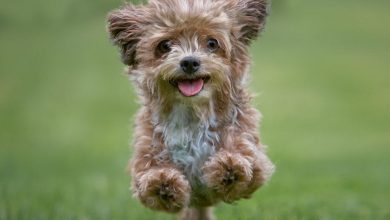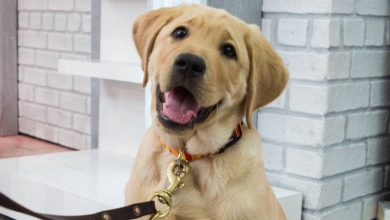Why Is My Dog Eating Slower Than Usual

Introduction
It is not uncommon for dogs to eat slower than usual. This can be due to a number of reasons, from health issues to simply being a picky eater. In this article, we will look at why your dog may be eating slower than usual and what you can do about it.
Reasons Why a Dog May Eat Slower Than Usual
There are several reasons why your dog may be eating slower than usual. These can include:
1. Picky Eating Habits: Just like humans, some dogs can be picky eaters and may take their time when it comes to eating. This can be due to the type of food they are eating or simply because they don’t find it as appealing as other meals.
2. Lack of Appetite: If your dog isn’t feeling well or is in pain, they may not have an appetite and therefore won’t eat as quickly as usual.
3. Age: As dogs get older, their metabolism slows down, which means they may take longer to finish their meals.
4. Stress: Just like humans, stress can affect a dog’s appetite and cause them to eat slower than usual.
Possible Health Issues That Could Cause a Dog to Eat Slower Than Usual
There are several health issues that could cause your dog to eat slower than usual. These include:
1. Dental Problems: If your dog has dental problems such as broken teeth or gum disease, they may find it difficult or painful to chew their food, which could cause them to eat slower than usual.
2. Digestive Issues: If your dog has digestive issues such as an upset stomach or diarrhea, they may take longer to finish their meals due to discomfort or pain.
3. Kidney Disease: Dogs with kidney disease often have decreased appetites and will take longer to finish their meals as a result.
4. Cancer: Dogs with cancer often experience weight loss and lack of appetite, which can lead to slower eating habits.
How to Monitor Your Dog’s Eating Habits
In order to determine if your dog is eating slower than usual, you should monitor their eating habits on a regular basis by doing the following:
1. Observe Your Dog’s Eating Habits: Pay close attention to how quickly or slowly your dog is eating each meal and compare it with previous meals they have had in the past few weeks or months. This will give you an idea of whether or not your dog is taking longer than usual to finish their meals.
2. Keep Track of Their Appetite: Monitor how much food your dog is consuming each day and compare it with previous days or weeks when you have noticed them eating faster than normal. If you notice a decrease in appetite over time, this could indicate that something is wrong and you should seek medical advice from your veterinarian immediately.
3 . Monitor Their Weight : Weighing your dog regularly can help you keep track of any changes in weight that could indicate health issues that could be causing them to eat slower than usual .
< h 2 > What You Should Do if You Notice Your Dog Eating Slower Than Usual ? < / h 2 >
If you notice that your dog is eating slower than usual , it is important that you take action right away . Here are some steps you should take :
1 . Consult With Your Veterinarian : The first step should be to consult with your veterinarian so they can assess the situation and rule out any underlying health issues that could be causing the slow eating . They may also recommend further tests or treatments depending on the diagnosis .
2 . Change Their Diet : If there are no underlying health issues , then changing up your dog’s diet could help encourage them to eat faster . Try switching up the type of food , adding more variety , or offering smaller meals more frequently throughout the day .
3 . Increase Their Exercise : Increasing exercise levels can help stimulate appetite in dogs , so make sure you are providing plenty of opportunities for physical activity throughout the day .
< h 2 > Common Causes of Slow Eating in Dogs < / h 2 >
There are several common causes of slow eating in dogs , including :
1 . Picky Eating Habits : Some dogs just don’t like certain types of food , so try offering different types of food until you find one that appeals more to them .
2 . Stress : Stress can affect a dog’s appetite , so make sure they are getting plenty of mental stimulation throughout the day and reduce any sources of stress in their environment .
3 . Age : As dogs get older , their metabolism slows down , so make sure you adjust their diet accordingly and provide smaller meals more frequently throughout the day .
4 . Dental Problems : Dental problems such as broken teeth or gum disease can make it difficult for a dog to chew their food , so make sure you take them for regular check – ups at the vet .
5 . Medical Conditions : Certain medical conditions such as kidney disease , cancer , and digestive issues can all affect a dog’s appetite and cause them to eat slower than normal . Be sure to consult with your veterinarian if you think this might be an issue for your pet .
< h 2 > How To Encourage Faster Eating In Dogs ? < / h 2 >
If you want to encourage faster eating in dogs , there are several things you can do :
1 . Offer Smaller Meals More Frequently : Offering smaller meals more frequently throughout the day can help stimulate appetite in dogs who tend to eat slowly due to age or medical conditions such as kidney disease or cancer .
2 . Add Variety To Their Diet : Adding variety such as frozen treats or wet food can help make meal times more exciting for picky eaters who tend to take longer when it comes time for dinner !
3 . Increase Physical Activity Levels : Increasing physical activity levels throughout the day can help stimulate appetite in dogs who tend to eat slowly due to stress or lack of exercise .
4 . Use Positive Reinforcement Techniques : Using positive reinforcement techniques such as praising your pup when they finish their meal quickly or offering treats after meal times can help encourage faster eating habits in dogs over time !
< h 2 > Signs Of Pain Or Discomfort When Eating < / h 2 >
If you suspect that your pup may be experiencing pain or discomfort while eating , look out for these signs :
1 . Drooling Excessively : Drooling excessively while eating could indicate pain while chewing due to dental problems such as broken teeth or gum disease .
2 . Refusing To Eat Or Taking Long Breaks Between Bites : Refusing food altogether or taking long breaks between bites could indicate digestive discomfort due to an upset stomach , diarrhea , etc ..
3 . Vomiting After Meals Or Not Finishing Food Entirely : Vomiting after meals or not finishing food entirely could also indicate discomfort due either physical pain from dental problems or digestive issues such as an upset stomach or diarrhea ..
4 . Coughing Or Gagging After Eating : Coughing or gagging after meals could indicate that something is stuck in the throat which could cause choking if not addressed immediately ..
5 . Unusual Behavior Changes During Meal Times : Unusual behavior changes during meal times such as pacing around anxiously before starting a meal could indicate stress which could lead to slow eating habits ..
< h 2 > Tips For Feeding Your Dog < / h 2 >
When feeding your pup , here are some tips that will help ensure they stay healthy and happy !
1 . Offer A Balanced Diet : Make sure you offer a balanced diet with plenty of protein , carbohydrates , fats , vitamins & minerals ..
2 . Feed The Right Amount Of Food For Their Size & Age Group : Make sure you feed the right amount of food according appropriate for their size & age group ..
3 . Avoid Overfeeding & Underfeeding : Overfeeding & underfeeding should both be avoided since this can lead unhealthy weight gain/loss ..
4 . Provide Plenty Of Fresh Water Everyday : Make sure there is always fresh water available for your pup at all times ..
5 . Avoid Human Foods That Are Harmful To Dogs ( E..g Chocolate ) : Human foods such as chocolate should always be avoided since these contain ingredients that are toxic for dogs ..



